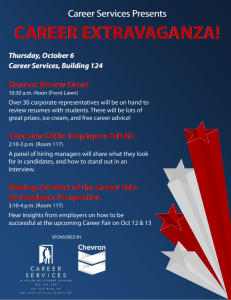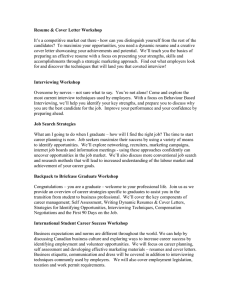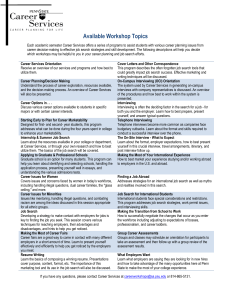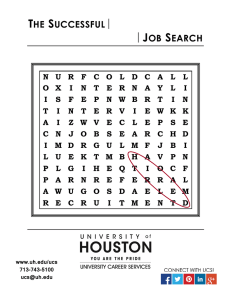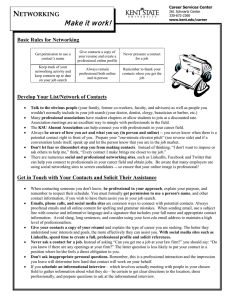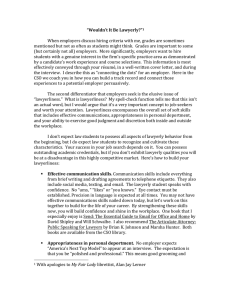The Office of Career Services: Creating A Job Search Plan
advertisement
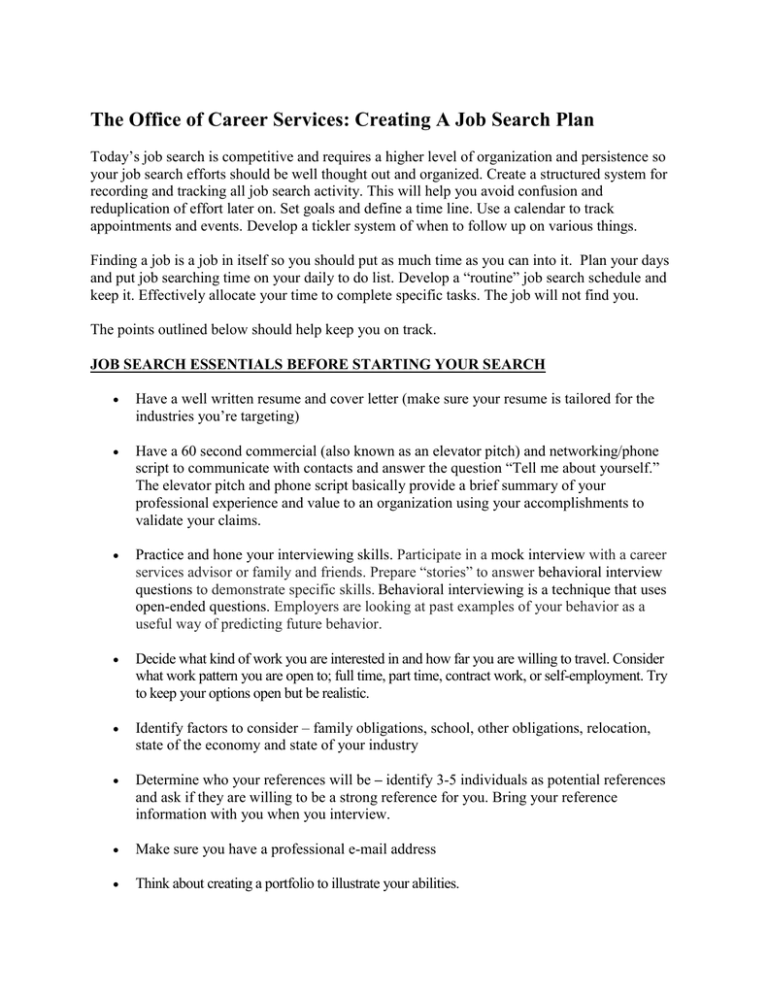
The Office of Career Services: Creating A Job Search Plan Today’s job search is competitive and requires a higher level of organization and persistence so your job search efforts should be well thought out and organized. Create a structured system for recording and tracking all job search activity. This will help you avoid confusion and reduplication of effort later on. Set goals and define a time line. Use a calendar to track appointments and events. Develop a tickler system of when to follow up on various things. Finding a job is a job in itself so you should put as much time as you can into it. Plan your days and put job searching time on your daily to do list. Develop a “routine” job search schedule and keep it. Effectively allocate your time to complete specific tasks. The job will not find you. The points outlined below should help keep you on track. JOB SEARCH ESSENTIALS BEFORE STARTING YOUR SEARCH Have a well written resume and cover letter (make sure your resume is tailored for the industries you’re targeting) Have a 60 second commercial (also known as an elevator pitch) and networking/phone script to communicate with contacts and answer the question “Tell me about yourself.” The elevator pitch and phone script basically provide a brief summary of your professional experience and value to an organization using your accomplishments to validate your claims. Practice and hone your interviewing skills. Participate in a mock interview with a career services advisor or family and friends. Prepare “stories” to answer behavioral interview questions to demonstrate specific skills. Behavioral interviewing is a technique that uses open-ended questions. Employers are looking at past examples of your behavior as a useful way of predicting future behavior. Decide what kind of work you are interested in and how far you are willing to travel. Consider what work pattern you are open to; full time, part time, contract work, or self-employment. Try to keep your options open but be realistic. Identify factors to consider – family obligations, school, other obligations, relocation, state of the economy and state of your industry Determine who your references will be – identify 3-5 individuals as potential references and ask if they are willing to be a strong reference for you. Bring your reference information with you when you interview. Make sure you have a professional e-mail address Think about creating a portfolio to illustrate your abilities. EXECUTING YOUR JOB SEARCH PLAN Make a list of contacts starting with the people you know like family, friends, acquaintances, professors, coworkers and other professionals who can help you in your search with leads, openings or information. Remember that LinkedIn is a great tool for managing and growing your contacts and network. Network, network, network and let others know you are searching for your next opportunity Identify all sources of job leads and job postings Identify employers Send out targeted mailings – send customized resumes and cover letters to potential employers you’ve identified. Follow up via phone or email if you haven’t heard from them in 2 weeks. Conduct informational interviews to find out more about jobs that interest you by talking to people in the industry. You will find this will either add to your interest or you may decide ‘it’s not for you after all’. Attend job fairs and conferences Identify and join the relevant professional associations for your field. Volunteer and build your skills – consider volunteering to gain experience in your field and to build new skills Please review our Job Search Techniques for additional detail. MANAGING YOUR JOB SEARCH PLAN Follow up - almost every job search effort requires follow-up. Your cover letter should state that you will follow up after a specified time period. If you are fortunate enough to get an interview you should also ask when would be the ideal time to follow up with the interviewers. If you do not hear from an employer after 2 weeks of submitting your materials, call or email to inquire about the status of your application. Be sure that the follow up is conducted professionally and that your focus is to get an update. Write Thank You Notes - after each interview, meeting, or lead received, be sure to send a thank you note, card or letter. You will stand out from the rest of your competition if you mail a handwritten note instead of just sending an email. Continue to research job leads and employers Evaluate your progress regularly. A reassessment of your goals may be necessary at some point. Re-strategize if your current direction isn’t working. Rejections will occur; treat them as learning experiences and move on. Stay healthy physically and mentally - exercise, eat healthy, and practice stress management Celebrate the achievement of goals, milestones and successes.

